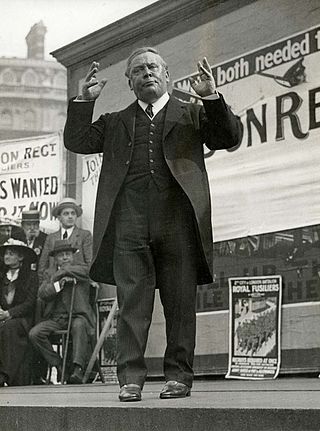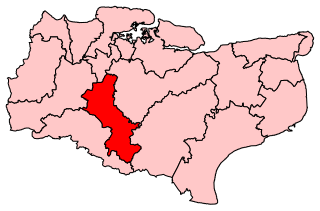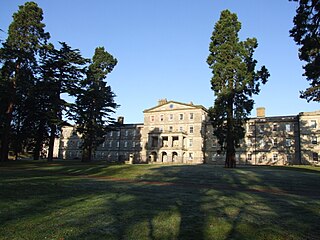
Execution by firing squad, in the past sometimes called fusillading, is a method of capital punishment, particularly common in the military and in times of war. Some reasons for its use are that firearms are usually readily available and a gunshot to a vital organ, such as the brain or heart, most often will kill relatively quickly.

Maidstone is the largest town in Kent, England, of which it is the county town. Maidstone is historically important and lies 32 miles (51 km) east-south-east of London. The River Medway runs through the centre of the town, linking it with Rochester and the Thames Estuary. Historically, the river carried much of the town's trade as the centre of the agricultural county of Kent, which is known as the Garden of England. There is evidence of settlement in the area dating back before the Stone Age. The town, part of the borough of Maidstone, had an approximate population of 100,000 in 2019. Since World War II, the town's economy has shifted from heavy industry towards light industry and services.

HM Prison Pentonville is an English Category B men's prison, operated by His Majesty's Prison Service. Pentonville Prison is not in Pentonville, but is located further north, on the Caledonian Road in the Barnsbury area of the London Borough of Islington, north London. In 2015 the justice secretary, Michael Gove, described Pentonville as "the most dramatic example of failure" within the prisons estate.

HM Prison Wandsworth is a Category B men's prison at Wandsworth in the London Borough of Wandsworth, South West London, England. It is operated by His Majesty's Prison Service and is one of the largest prisons in the UK.

Horatio William Bottomley was an English financier, journalist, editor, newspaper proprietor, swindler, and Member of Parliament. He is best known for his editorship of the popular magazine John Bull, and for his nationalistic oratory during the First World War. His career came to a sudden end when, in 1922, he was convicted of fraud and sentenced to seven years' imprisonment.

HM Prison Manchester is a Category A and B men's prison in Manchester, England, operated by His Majesty's Prison Service. It is still commonly referred to as Strangeways, which was its former official name derived from the area in which it is located, until it was rebuilt following a major riot in 1990.

Maidstone and The Weald was a constituency in Kent represented in the House of Commons of the UK Parliament. From the 2010 general election it was represented by Helen Grant of the Conservative Party. She succeeded fellow party member Ann Widdecombe, who had held the seat since it was created for the 1997 general election.

Faversham and Mid Kent is a constituency represented in the House of Commons of the UK Parliament. Since 2015, the seat has been held by Helen Whately of the Conservative Party.

William John Christopher Vassall was a British civil servant who spied for the Soviet Union, allegedly under pressure of blackmail, from 1954 until his arrest in 1962. Although operating only at a junior level, he was able to provide details of naval technology which were crucial to the modernising of the Soviet Navy. He was sentenced to eighteen years' imprisonment, and was released in 1972, after having served ten. The Vassall scandal greatly embarrassed the Macmillan government, but was soon eclipsed by the more dramatic Profumo affair.

HM Prison Belfast, also known as Crumlin Road Gaol, is a former prison situated on the Crumlin Road in north Belfast, Northern Ireland. Since 1996 it is the only remaining Victorian era former prison in Northern Ireland. It is colloquially known as the Crum.

HM Prison Lincoln is a Category B men's prison, located in Lincoln, Lincolnshire, England. The prison is operated by His Majesty's Prison Service. A category B prison which allocates convicted prisoners within its catchment area.
John Bull is the name of a succession of different periodicals published in the United Kingdom during the period 1820–1964. In its original form, a Sunday newspaper published from 1820 to 1892, John Bull was a champion of traditionalist conservatism. From 1906 to 1920, under Member of Parliament Horatio Bottomley, John Bull became a platform for his trenchant populist views. A 1946 relaunch by Odhams Press transformed John Bull magazine into something similar in style to the American magazine The Saturday Evening Post.
HM Prison East Sutton Park is a women's open prison and young offender's institute located in the Parish of East Sutton, near Maidstone in Kent, England. The prison is operated by His Majesty's Prison & Probation Service.

Oakwood Hospital in Barming Heath near Maidstone, England was a psychiatric hospital founded in 1833 as the Kent County Lunatic Asylum. Following transfer of services to Maidstone Hospital, Oakwood closed in 1994 and was then developed as a residential estate known as St Andrew's Park.
John Whichcord Sr. (1790–1860) was a British architect who worked in Maidstone, Kent and designed many public and institutional buildings in the town.
Capital punishment in Afghanistan is legal and could be carried out secretly or publicly. The convict could be hanged or shot to death. Stoning, amputation, and flogging were also sometimes used as a method for punishment, especially during the late 1990s. Public executions have existed throughout Afghanistan's history. They have continued with the Taliban returning to power in August 2021. Some executions were recently condemned by the United Nations. The capital offenses in Afghanistan generally include heinous crimes such as mass murder and are governed by Sharia, along with civil laws.

Tunbridge Wells Hospital is a large district general hospital in Pembury near Royal Tunbridge Wells, Kent, England, run by the Maidstone and Tunbridge Wells NHS Trust. The hospital is located on Tonbridge Road, around 0.5 kilometres (0.31 mi) to the north-west of Pembury, close to the A21 trunk road. It is surrounded by woodland on three sides.
Capital punishment is a legal penalty in Jordan. The country had a moratorium on capital punishment between 2006 and 2014. In late 2014 the moratorium was lifted and 11 people were executed. Two more executions followed in 2015, 15 executions took place in 2017 and one in 2021. The method of execution is hanging, although shooting was previously the sole method for carrying out executions.

Helen Olivia Bicknell Whately is a British politician serving as Minister of State for Social Care since October 2022, and previously from 2020 to 2021. She also served as Exchequer Secretary to the Treasury from 2021 to 2022. A member of the Conservative Party, she has been Member of Parliament (MP) for Faversham and Mid Kent since 2015.
Patrick MacGrath was born into an old Dublin republican family and took part in the 1916 Rising, as did two of his brothers. He was sent to Frongoch Internment Camp after the 1916 Rising and served his time there. He was a senior member of the Irish Republican Army (IRA), hunger striker, IRA Director of Operations and Training during its major bombing/sabotage in England and was the first of six IRA men executed by the Irish Government between 1940–1944. After participating in the Easter Rebellion, MacGrath remained in the IRA, rising in rank and becoming a major leader within the organisation.















